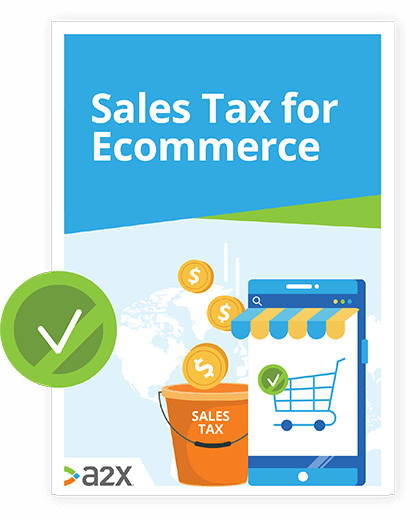Sales Tax Strategies for Ecommerce Sellers
Written by: Denym Bird
This article is based on a guest post from our good friends at MuseMinded.
For ecommerce sellers, sales tax compliance can be overwhelming.
Even if you are a US-based seller just trading domestically, the differences in requirements across the country are dizzying at times.
Tax laws surrounding ecommerce sellers are still relatively new - like the industry itself. The wrinkles have yet to be ironed out, and so sellers today (and their accountants) are amongst the first to find their feet in a complex, evolving system.
It is crucial though, that they (you) do, because those new laws mentioned are aimed in your direction. Are you meeting your obligations? The IRS wants to know, so you’ll need a strategy for managing your taxes at early in your business journey as possible.
Ideally, right at the start, no matter how much you sell or where.
There is some strategy involved in sales tax. We will look at the three most common approaches taken by sellers but if you are new to sales tax or unsure, we strongly recommend getting help from a specialist ecommerce accountant. Non-compliance can be a costly end to your business, so it’s not worth taking a risk.
In this article, part of our Ecommerce Accounting Hub:
The ‘By-the-Book’ Approach
Exactly what it sounds like: this approach is all about ticking every box right off the bat.
This method involves registering for a sales tax certificate in every state where you have nexus, no matter how small the amount of business you have may be. It is often advised by accountants that want their clients to take the safest and most conservative course of action.
Benefits of this approach include having total peace of mind, and knowing that you are following the law properly. It’s very black and white, and there are no complicated decisions that you need to make.
However, it is a very expensive (and potentially time-consuming) way of managing your tax obligations, and it’s not the only option.
To begin with, you will need to register in every state where you have nexus. Then, every month, quarter or year, you will have to file sales tax returns in each one of them - regardless of whether you owe any sales tax or not.
It also does not take into consideration the cost of compliance vs. the cost of non-compliance.
For example, would you pay an accountant $100 in order to avoid a $50 fine from the state?
This approach is ideal for people who just want to get the matter off their hands no matter the cost, and people who cannot sleep at night knowing that they might get a letter from the tax department.
The bottom line: It’s the safest approach, but might cost you a bit more.
The ‘Wait and See’ Approach
This approach involves signing up for a sales tax certificate in your home state, but not any of the other states where your inventory is located, or you make sales - no matter how large your business becomes.
It is a strategy which is commonly recommended by Amazon FBA sellers in online forums. In their view (or the view of their local accountant), sales tax laws are constantly changing, and there is so much confusion around what is and isn’t nexus.
That being the case, they choose to wait until clearer rules are presented, in the hopes that none of the other states find out that they aren’t paying sales tax. It used to be quite hard for a state that is not your home state to police you, but this is unlikely to remain the case for long - so this is a risky strategy.
It is definitely a cheaper way of managing sales tax obligations, but it is fraught with risk. If you are caught, you will be required to pay all of the backdated taxes, plus penalties and interest.
Each year, as your business grows larger, the relative cost of compliance compared to the consequences of getting caught make it less worthwhile. Why risk the viability of your business to save $200-300 per month?
“Eventually it becomes a bit penny wise and pound foolish, as they say.”
- MuseMinded sales tax crash course.
If a state decides to audit your business, they can backdate their records as far into the past as they like. If you haven’t been paying sales tax for 10 years, then you are going to be in for quite the surprise!
The bottom line: It’s a risky approach, and could result in a huge bill as much as no bill at all.
The ‘Stair Step’ Approach
If the first two approaches were on opposite ends of a spectrum, then this one is in the middle.
The ‘stair step’ approach involves starting by registering in your home state. Then as your business grows, you add more states on a gradual basis until you become fully compliant.
More specifically, this method involves taking the following actions:
- Register for a sales tax license in your home state if you haven’t already done so.
- Set a tax liability limit for each of the non-home states (e.g: $1,000 or $5,000 or whatever suits your level of risk tolerance). These will be your thresholds for registration.
- Once the total aggregate amount of sales tax that you should have collected in any given state exceeds the predefined threshold, then you would register for a sales tax license in that state.
The main advantage of this sales tax strategy is that it gives your business a chance to really pick up momentum before you go about registering all over the place. It limits your upfront costs whilst decreasing your long-term risk.
Sellers often reach their thresholds first in California, Texas, and Florida, then take a while before needing to comply in other states. By registering first in these states, you get more impact for your spending early on when you have fewer resources.
Although this method of handling sales tax obligations does reduce downside risk whilst controlling costs, there is still a relatively small risk of being audited, which must be taken into account when deciding on a strategy to proceed with.
If you decide to use the ‘stair step’ approach, it is worth considering using a tool such as TaxJar to help with calculating, preparing and filing returns. TaxJar also has a function that keeps track of how much unpaid sales tax liability you are collecting in states where you haven’t registered, so those thresholds you set are easy to track.
The bottom line: This gives your business time to grow, but you still risk a bill for non-compliance if you wait too long to register.
To Pay or Not to Pay? That is Not the Question
If you are an ambitious professional ecommerce seller then you’ll need to pay sales tax at some stage. The question is not whether to pay, but when and who to.
The best way to get the biggest bang for your buck and make informed decisions for your business is to enlist the help of a specialist. Ecommerce accountants understand the industry, its quirks, and its place in the wider tax system.
They can give you the best advice based on their experience and your business.
Find an accountant from our ecommerce accountant directory here.
By integrating A2X with your accounting software you can keep track of exactly how much sales tax you have collected in your bank deposits. So whenever you choose to pay, you’ll know what you owe every time.
Learn More
You can find dedicated guides to collecting sales tax for your ecommerce platform via these links:
You can also learn more about the latest tax rates, filing frequencies, and where you need to go to register in each state, at www.taxjar.com/states.
MuseMinded’s free sales tax crash course covers the sales tax strategy approaches in more detail, and looks at a range of other important topics related to getting compliant with sales tax.
Another guide from Museminded:
Next in the Series…
This blog is part of our ecommerce sales tax hub series. Next up, we go through the options you have for filing your taxes ➡️ Read now.

Learn how to manage your sales tax obligations like a pro
Sales tax is complex and the costs for getting it wrong can be significant. Discover the key terminology, compliance strategies as you grow, and how to set your business up for success.
Download our free guide

